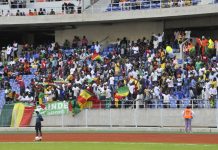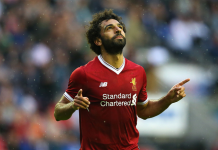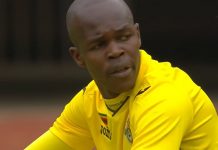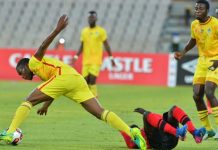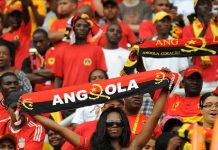There have been many magical matches in the COSAFA Cup since the competition was first played in 1997, with moments that have been written into Southern African football folklore.
As we gear-up for the 2019 COSAFA Cup to be staged in Durban from May 25-June 8, it is worth a reminder of five of the best games down the years to whet the appetite.
Here is our list of the top five:
24/1/98 – NAMIBIA 3 SOUTH AFRICA 2
One of the great early moments in the COSAFA Cup came in the second tournament held in 1998 as Namibia stunned South Africa’s FIFA World Cup-bound stars with a 3-2 victory in Windhoek. The victory made Namibia at the time only the third team from the Southern African region to defeat Bafana Bafana after Zimbabwe and Zambia and was one of the finest hours for coach Rustin Mogane at the country’s Independence Stadium.
South Africa had not competed in the inaugural COSAFA Cup competition but with the World Cup in France looming, caretaker coach Jomo Sono was eager to give his squad a run.
They arrived in Windhoek for the game on January 24, 1998, with most of their top stars, including emerging teenager Benni McCarthy, Phil Masinga, Mark Fish and Brian Baloyi.
And all appeared to be going to plan as Thabo Mooki put South Africa ahead six minutes before halftime, driving a low shot past home goalkeeper Ronny Kanalelo. But shortly afterwards Namibia were back level as Bafana Bafana hesitated at the back and 31-year-old Stanley Goagoseb was able to drill the ball into the roof of the net.
South Africa were back in front just past the hour-mark when McCarthy showed some excellent skills to dribble past three defenders and set up Masinga for the easiest of finishes. It looked as though the visitors had the game sewn up, before Bimbo Tjihero blasted home a free-kick just a minute from the end to make the score 2-2 and send the fixture into extra-time.
The decisive moment of the game came in the 100th minute when Johannes ‘Congo’ Hindjou dazzled the South African defence with some fast footwork and his cross was met by Berlin Auchumeb to send the home crowd into delirium.
The match was part of a winless run of nine matches for Bafana Bafana that would come to an end at the 1998 African Nations Cup finals … against Namibia.
Sono’s men got some revenge as McCarthy netted four goals in 13 first half minutes at the finals in Burkina Faso to secure a 4-1 success.
So South Africa’s first ever COSAFA Cup tournament was brought to an early end, while Namibia would go on to finish fourth in the final round pool stage that in the first two tournaments decided the winner.
5/5/02 – ZIMBABWE 0 SWAZILAND 2There are not many sides that travel to Harare and come away with a win in any competition, but it has proven an especially tough venue for teams in the COSAFA Cup. Going against that grain were the Swaziland side that competed in the 2002 tournament as they faced-off against Zimbabwe in the quarterfinals and came away with a stunning 2-0 victory.
It was one of the great shocks in the early years of the COSAFA Cup and still today remains one of the biggest upsets in the competition’s two-decade history. At the time it was arguably the biggest victory in the history of the Swaziland national side, who were then ranked number 132 in the world, but came away with a victory against a home team placed 67 positions above them.
It was the first time Swaziland had beaten Zimbabwe and the first away win for the Swazis in six years of competing in the annual southern African championship. Strikers Siza Dlamini and Sibusiso Dlamini both scored in the second half against a Zimbabwean side featuring five overseas-based professionals in their starting line-up.
Siza Dlamini burst through the midfield and shrugged off several defenders, running half the length of the pitch before chipping over Zimbabwe’s goalkeeper Tapuwa Kapini for the opening goal on the hour mark. Zimbabwe’s English-based captain Peter Ndlovu and striker Benjani Mwaruwari, who back then played in Switzerland with Grasshoppers, carved out several chances for the hosts in the opening 15 minutes.
But as the game progressed Swaziland gained in confidence and sealed a remarkable victory in stoppage time when Sibusiso Dlamini outsprinted the goalkeeper to a loose ball and scored into an empty net from a tight angle.
“It was a disgraceful performance, we have no excuses,’ said Ndlovu afterwards.
Swaziland advanced to the semifinals to meet South Africa, where they were beaten 4-1 by the eventual champions.
19/7/08 – SEYCHELLES 7 MAURITIUS 0
Seychelles have only ever won a single match in the COSAFA Cup competition, but it turned out to be one of the greatest days in their football history. The Pirates found their form in stunning style in their opening match of the 2008 COSAFA Cup as they thumped Indian Ocean rivals Mauritius 7-0 in one of the greatest shocks in the history of the regional championship.
It was not so much that they registered the win, but the manner in which they did it as they tore the Mauritius defence to shreds. Striker Philip Zialor proved the hero as he bagged four goals, to go with strikes from Colin Laporte, Don Annacoura and Trevor Poiret.
Seychelles only led 2-0 at half-time but ran riot in the second period as Coach Ulrich Mathiot, who also led the team at the 2015 COSAFA Cup, masterminded their success. Laporte gave Seychelles the lead on 14 minutes before Zialor got his first with a fine strike.
From then on it became the Zialor show as he bagged two more in an eight-minute spell just after halftime, before getting his fourth goal just before the end.
That came a minute after Poiret had netted for The Pirates, with Annacoura getting his goal midway through the second half. Zialor had also played in the COSAFA Cup in the three previous years, and would do so again in 2009, but this was the one and only time he found the back of the net.
The win is not the biggest in Seychelles’ history, they grabbed a 9-0 win over minnows the Maldives in 1979.
28/5/15 – MADAGASCAR 2 NAMIBIA 3
Namibia booked their place in the final of the 2015 COSAFA Cup with an epic 3-2 victory over Madagascar in a see-saw semifinal that will forever go down as a classic clash in the competition.
The Brave Warriors would go on to lift the title after a far more routine 2-0 victory over Mozambique, but not before they had to come through a huge test against the Malagasy.
Peter Shalulile got the winner for the Brave Warriors six minutes from time after Namibia had led early on, but then fell behind to two quick-fire goals from the islanders. Benson Shilongo gave Namibia the lead on 18 minutes with a neat finish, but Sarivahy Vombola, who would end up as top-scorer in the 2015 COSAFA Cup, profited from two defensive errors from the Namibians to turn the tables and make the score 2-1 in Madagascar’s favour.
Namibia did not panic though and Shilongo equalised just past the half-hour mark in what was a frenetic start to the game. Both sides had their chances after that with Shalulile in particular missing a sitter that he would have scored 99 times out of 100. He finally did get the winner though when he turned home a cross to send the Namibian squad into rapturous celebration.
Namibia, who hosted the 2016 COSAFA Cup, become just the fifth side to win the trophy.
But this was by far their most memorable game on their way to the title win and one of the best in COSAFA Cup history.
9/6/18 – ZAMBIA 2 ZIMBABWE 4
A brace from Tino Kadewere saw defending champions Zimbabwe grab a late equaliser and then go on to win in extra-time with a 4-2 success over Zambia in a pulsating 2018 COSAFA Cup final at the New Peter Mokaba Stadium in Polokwane, South Africa. Zimbabwe extended their record of tournament wins to six and were also the third nation to claim back-to-back titles after Zambia and South Africa.
It was a fourth tournament win for Zimbabwe coach Sunday Chidzambwa, extending his record as the most successful coach in COSAFA Cup history, and he remains unbeaten after 18 matches in the Southern African championship. Kadewere opened the scoring early, but a brace from Zambian forward Lazarous Kambole swung the final in the favour of Chipolopolo.
Sweden-based Kadewere bagged an equaliser three minutes into injury-time at the end of the game and Khama Billiat then slotted a penalty and scored another to secure the title for the Warriors.
The final got off to an electric start as Kadewere found a gaping hole in the defence and with just Toaster Nsabata is the Zambian goal to beat, he coolly slotted the ball into the net.
That had the sizeable Zimbabwe support on their feet, but the lead last only four minutes before Zambia scored an almost carbon-copy goal. Kambole ghosted in between the Zimbabwe centre-backs and easily rounded goalkeeper George Chigova before placing the ball in the net to equalise.
Zambia hit the front five minutes into the second period with another goal from the red-hot Kambole as he beat the offside trap and fired past Chigova from a tight angle that required power and precision.
Zimbabwe had an excellent spell at the other end as first Marshall Munetsi saw his effort from a corner saved by Nsabata, before Billiat and substitute Evans Rusike both went for the same volley and in the end it was a tame effort from the latter that was easily collected by the Zambian keeper.
As Zimbabwe pushed forward in search of an equaliser, they left holes at the back, but newly-arrived substitute Ronald Kampamba could not exploit these as he put his shot against the post when well-placed to score.
And he was made to pay as Zimbabwe went up the other end and scored in injury-time at the end of the second half, with Kadewere turning the ball home from close-range to force the game into extra-time. Zimbabwe were the stronger at the start of extra-time and won a penalty when Billiat was brought down in the box. He brushed himself off to take the spot-kick and buried it into the corner of the net.
And the win was sealed when Zimbabwe mounted a counter-attack that had three forwards on two defenders, eventually working the ball to Billiat to complete his brace.



